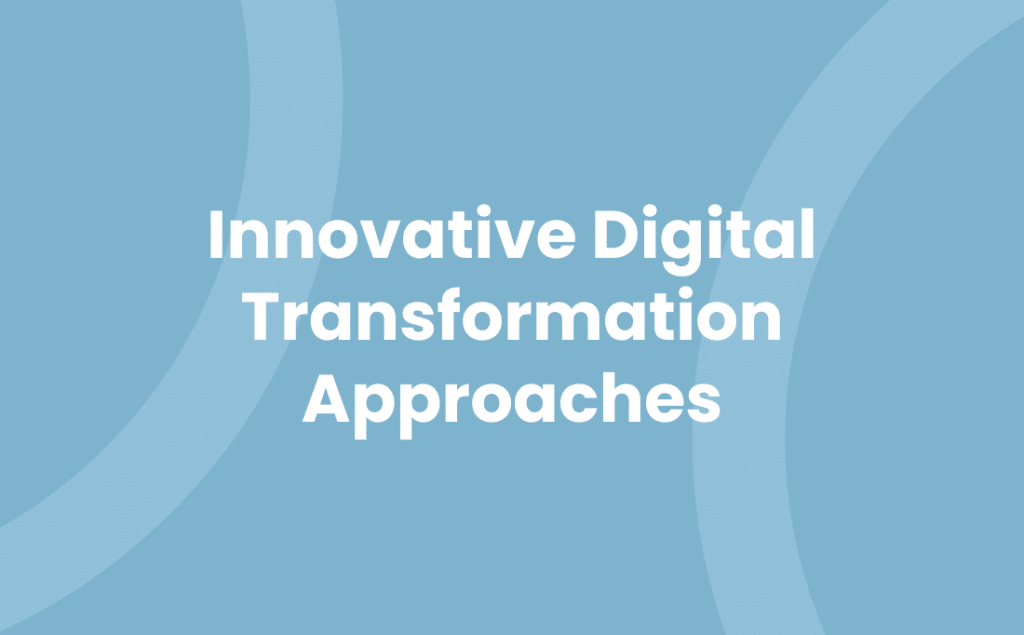In an era where technology reigns supreme, digital transformation is no longer a luxury‚ it’s a necessity. It’s the key to unlocking the vast potential of innovation, opening doors to new business models, and creating opportunities for growth. But what exactly does it entail and how can you harness its power?
Whether you’re a seasoned tech guru or a novice just dipping your toes into the digital pool, understanding digital transformation and its role in innovation is critical. This article will shed light on the subject, providing you with the knowledge you need to navigate the ever-evolving digital landscape. Let’s dive into the world of digital transformation and uncover the innovative strategies that can propel your business to new heights.
The Concept of Digital Transformation Innovation
Peel back the layers of digital transformation innovation, and you’ll find a vibrant core that’s reshaping the trajectory for businesses globally. The term, broader in its capacity, converges technology and business strategies to enhance operational efficiency and pioneer unparalleled customer experiences. Specifically, digital transformation involves incorporating digital technology into all areas of a business. Innovation, though, goes a step further. It’s the creative process of utilising digital tools to bring forth pioneering solutions that reshape traditional business operations.
Crafting stellar digital innovation strategies isn’t mere child’s play. You’re not merely plugging in a couple of digital tools or signing up for some trendy software. Instead, you’re architecting an entire ecosystem that thrives on efficient digital operations, maximises resource utility, and sustains continuous business improvement. This strategy interweaves digital transformation elements such as Big Data, Artificial Intelligence (AI), Internet of Things (IoT), Blockchain, and more. For instance, AI can automate customer interactions, while Big Data analytics can offer in-depth customer insights.
Finding your way through the labyrinth of digital transformation can seem intimidating. Yet, understanding a few key facets simplifies this journey. First off, kick off operations with digital-first strategies. This means prioritising digital solutions. Next, promote a culture of innovation within your enterprise. Encourage learners to experiment with novel ideas, break traditional norms and adopt innovative technologies. Lastly, ensure continuous learning. Digital landscapes evolve continuously – it’s vital that you keep up with these transformations.
Remember, the essence of digital transformation innovation rests in its ability to redefine business models, promote efficiency, enhance customer experience, and create competitive advantages. So, it’s time to turn the tables around and give your business the digital makeover it deserves.
The Current State of Digital Transformation Innovation
The digitisation wave has swept across the globe, connecting people, processes and technologies, and fostering an environment of continuous innovation. This phenomenon, labelled as Digital Transformation Innovation, gives birth to a new realm of possibilities, expanding horizons for businesses.
In today’s environment, firms anchor their strategies on digitisation, evolving beyond traditional boundaries. Entrepreneurial ventures and established corporations alike are realising the unprecedented benefits this digital change presents. With a keen focus on revolutionising operations, businesses are harnessing digital capabilities not just to survive, but to thrive.
The integration of cutting-edge technologies such as Big Data, Artificial Intelligence (AI), Internet of Things (IoT), and Blockchain forms the crux of these digital innovation strategies. Leveraging these technologies, operations become smoother, processes more efficient, and customer experiences superior. The end result? A competitive advantage in the marketplace.
However, the path to digital transformation isn’t a cakewalk. Navigating through this journey requires dedicated efforts, adaptable mindsets, and a culture receptive to continuous learning. It’s no longer optional; rather, it’s become a key determinant of survival in this rapidly evolving business landscape.
Businesses are redefining strategies and realigning processes altered by this digital revolution, moving away from one-size-fits-all solutions. It’s a shift towards tailor-made digital strategies, crafted with careful consideration and accurate predictions. These manifest as flexible, scalable solutions that serve the best interests of the organisation.
As we scan the current state of digital transformation innovation, it’s evident that agile businesses lead the way, possessing a remarkable ability to adapt swiftly to the ever-changing digital ecosystem. They constantly look for innovative tools and processes to enhance their operations, always staying a step ahead.
In essence, the current state of digital transformation innovation champions the fusion of business and technology, transcending traditional approaches to facilitate sustainable growth. It’s the era of innovation that prioritises digital-first approaches and values the power of technology in revolutionising traditional business operations. It stresses the importance of crafting comprehensive innovation strategies, fostering a culture of continuous learning and embracing change. This way, businesses navigate the complexities of digital transformation and leverage digital innovation to reshape the way they work, gaining a competitive advantage in the process.
The Importance of Digital Transformation Innovation
Harnessing the power of digital transformation innovation paves the path for achieving new height levels in your business. You’ve probably realised by now that this isn’t just a trendy buzzword. It’s a strategy, vital for the survival and success of your business amidst the burgeoning technology-driven market.
Let’s unravel the importance of digital transformation innovation in the realm of business.
Opens Avenues for Novel Business Models
Digital transformation innovation acts like an open door, ushering you into a whole new world of business strategies. It presents myriad possibilities and operation models. For instance, you can adopt data-driven strategies or jump on the bandwagon of AI-powered tools. Such implementations often lead to breakthrough business models that not only withstand but thrive in the ever-evolving technological climate.
Fuels Enhanced Customer Experience
Digitisation makes room for significant customer service upgrades. The introduction of AI chatbots or personalised recommendation systems backed by machine learning algorithms exemplify such upgrades. Such innovations ensure your customers feel valued, maintain continuous engagement, and thus, foster loyalty.
Streamlines Operations and Maximises Efficiency
Imagine having the power to trim down operational inefficiencies with a single click or automate redundant tasks! Digital innovations make it possible. Businesses leveraging smart software or cloud technologies can vouch for reduced operational bottlenecks and optimised workflows.
Boosts Competitive Advantage
In a rapidly digitising business landscape, the ‘survival of the fittest’ mantra rings truer than ever. By incorporating digital transformation innovation, you arm your business with a formidable advantage. It’s a game-changer that gives your business the edge it needs to stay a cut above the rest.
In the face of incessant technological advancements, digital transformation innovation is no longer an option – it’s the road to unprecedented business growth. It is embracing the power of change, it’s stepping into the future.
Case Studies of Successful Digital Transformation Innovation
Following the grasp of the importance and depth of digital transformation innovation, you’re likely eager to see its direct impact in action. Not just theories, but real-life practices spotlighting how it re-shapes traditional business operations and drives growth. Thus, we’re shedding light on actual case studies of organisations that have successfully adopted and benefited from digital transformation innovation.
First in line is Microsoft, a tech giant that’s always on the cutting edge. Struggling with diminishing software sales in 2014, Microsoft shifted its prime focus from software to digital services and cloud computing. By integrating Big Data, AI, and IoT into their operational processes, they introduced innovative products like Microsoft 365 and Azure. This drastic shift not only increased their annual revenue by 14% in 2020 but also attracted a new customer base and revived their market dominance.
Following closely is Domino’s Pizza, a prime exemplar of an enterprise embracing digital innovation within the food industry. By focussing on digital-first customer experiences, from online ordering through various digital platforms to tracking delivery using AI, Domino’s re-engineered its entire business model. And the reward? They’ve seen an astonishing growth in their digital sales, accounting for more than 60% of their total revenue as of 2019.
Next up, Walmart’s strategies for digital transformation innovation are worth your attention too. As a proactive approach to combat intense competition from e-commerce companies, Walmart massively invested in digital technologies. With the help of Big Data and AI, they redesigned their online shopping experience, streamlined inventory management, personalised customer interaction, and dramatically boosted their e-commerce sales.
These instances illustrate just how instrumental digital transformation innovation can be to an organisation’s success. They bring home the fact that, regardless of the sector, every business has the potential to leverage digital innovation to its fullest, driving unprecedented growth while making a mark on the digital landscape.
Challenges and Solutions in Digital Transformation Innovation
Navigating digital transformation innovation doesn’t come without its fair share of obstacles. Fortunately, these are often paired with solutions that are just as innovative.
- Challenge: Integration of New Technologies
Digital innovation isn’t merely about adopting the latest technologies, such as AI, IoT, or Blockchain. It’s about integrating these into your current systems. But, if you’re grappling with outdated infrastructure, this task can seem daunting.Solution: Incremental Adoption
Adopt a step-by-step approach. Incorporate one technology at a time into your operations. This allows for careful monitoring of the integration process and makes identifying any glitches easier.
- Challenge: Cybersecurity Concerns
As you delve into the world of digital transformation, the threat of cyber attacks becomes increasingly significant. Safeguarding against data breaches is paramount in this digital era.Solution: Robust Security Measures
Invest in robust cybersecurity measures. Regularly update your security systems to combat the ever-evolving nature of cyber threats.
- Challenge: Employee Resistance
Change can be hard. Your team may resist learning new technologies.Solution: Comprehensive Training Programmes
Implement detailed training programs. Ensure your team is confident in using new technologies.
- Challenge: Cost Implications
As a business owner, you’re undoubtedly aware of the costs associated with implementing innovative digital technologies.Solution: Long-term Investment Mindset
View digital transformation innovation as a long-term investment. Keep in mind that while initial costs might be high, the benefits reaped can lead to significant ROI.
By understanding these challenges and actively seeking solutions, you are not only navigating the complexities of digital transformation innovation but setting your business up for success in the ever-changing digital landscape.
Future of Digital Transformation Innovation
In your journey towards digital transformation, it’s pivotal to grasp the future trends that are shaping this sphere. Step up and visualise the future, anticipate change, and harness the power of digital transformation innovation to accelerate your growth.
Leveraging AI and machine learning appears as notable trends in the future. Instead of manual analysis, AI systems sift through the humongous amounts of data you’ve collected. With machine learning, they predict customer behaviour, pioneer personalised interactions, and improve efficiency. With AI as your co-pilot, the sky’s the limit!
IoT continues to play a pivotal role in your business’ digital transformation. In the future, expect to see an amplified connected ecosystem. Connected devices will multiply, garnishing you with real-time data and insights. Your interactions with customers and suppliers become more intelligent, and efficiency scales new heights.
Your cybersecurity will be top notch, as digital transformation recognises it not as an afterthought but an integral element, even more so in the future. Cybersecurity measures become more sophisticated, designed to prevent breaches and ensure secure data handling.
More power to the people, as upskilling on digital skills takes centre stage! Embracing digital tools is a team sport. So, fear of the unknown is managed effectively with comprehensive training programs. In future, constant learning becomes a part of the corporate culture.
Automation takes a new edge, making mundane tasks a thing of the past. Rapid automation processes become common, freeing up employees’ time for more strategic and creative tasks.
Finally, let’s get down to the brass tacks. Digital transformation isn’t just about survival, it’s about thriving! Seeing the future trends, embracing them, it positions you ahead of the competition. As digital innovation continues its frenetic pace, stay resolute in your drive for continual improvement. The future belongs to those who innovate, and who better to make headway in the digital transformation innovation than you?
Conclusion
So, you’ve seen how digital transformation innovation isn’t just a buzzword, it’s a vital strategy for business growth. Embracing technologies like Big Data, AI, IoT, and Blockchain can catapult your business to new heights. Sure, there are challenges, but with a strategy of incremental adoption and a focus on robust security measures, they’re not insurmountable. Looking ahead, AI, machine learning, IoT, cybersecurity, upskilling, and automation are the future trends you can’t afford to ignore. By staying on top of these, you’re not just surviving the digital landscape, you’re thriving in it. So, are you ready to take your business to the next level? The future is digital, and it’s time for you to lead the charge.



